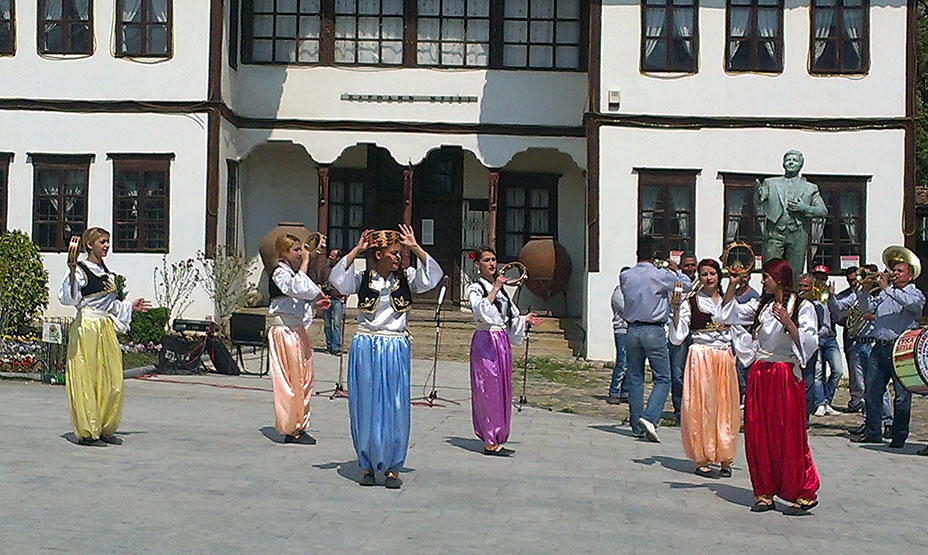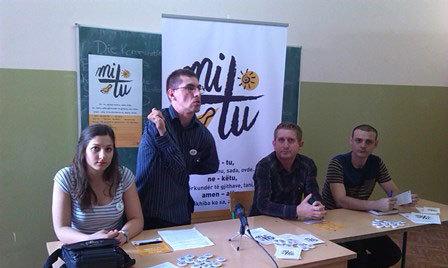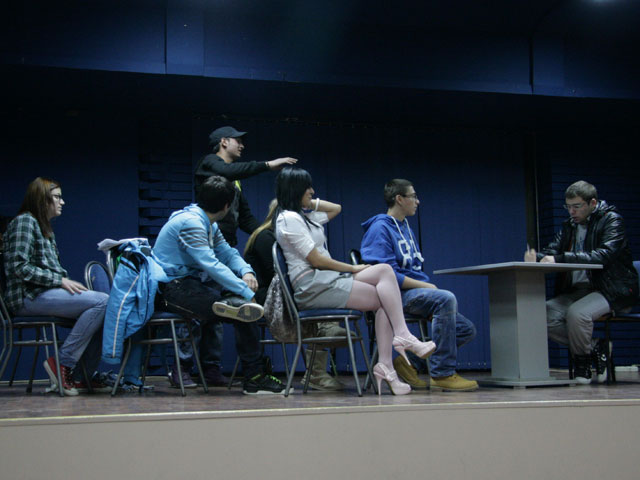


Equlize me!, 2013-2014
supported by national EIDHR (70,000 EUR)
Project was implemented in 5 municipalities in South Serbian. The aim of the project was to increase the sensitivity of society and the promotion of tolerance towards different minority groups and to empower youth for active participation in the local community, as well as to build capacities of institutions working with minorities. Huge raising-awareness campaign was implemented in cooperation with all project participants. For its activities related to the problems of LGBT population Generator was nominated for the best action on LGBT in Serbia in 2014.
https://www.youtube.com/watch?v=IzyYXaVdnUQ
Minorities’ rights – obligation of majority, 2012-2013
in partnership with Novine vranjske, supported by Norweigan Embassy in Belgrade (values: 60,000 EUR). Project was implemented in South Serbian towns of Vranje, Bujanovac, Preševo, and five high schools are included. The aim of the project was to increase the sensitivity of society and the promotion of tolerance towards different minority groups to empower youth for active participation in the local community. Project represents combination of activities of media and youth activists who together implemented big campaign about minority rights. One of the project activities was a song created by young project participants in cooperation with French musicians for the purpose of promotion of the tolerance in the moment of current crisis caused by setting up the monument in Preševo November 2012. https://www.youtube.com/watch?v=KZZQlOxmttw




TED - Theater for Ethnic Dialogue, 2012
project supported by UNICEF (value: 30.000$). TED was 1-year project aimed at raising awareness among youth on human and minorities rights violation, anti-discrimination, inclusion as well as at including young Serbs, Roma and Albanians from 6 Southern Serbian municipalities in joint actions in the local community. The partnering institutions were Youth Offices, Office for Roma Issue, secondary schools and parents' councils in order to ensure cooperation between civil society, local governments and institutions. By educating 660 teenagers and their teachers and parents through interactive, socially-engaged theatre plays that allow public discussion and open dialogue, we wanted to raise awareness of youth, local authorities, institutions, parents and other citizens about importance of inclusion of young people from different ethnic minority groups.
New creative choices– Inclusion of Roma through theater, 2011-2012
supported by Open Society Foundation from Budapest, (value 20,000 EUR) where a group of young Roma and Serbs worked together on engaged theatre performances on the topic of ethnic minorities’ rights. The lead partner was CEDEUM – Centre for drama and art in education. A group of young Roma and Serbs worked together on engaged theater performances on the topic of ethnic minorities’ rights. 6 of them were trained to become peer trainers and work with young Roma. The activities were implemented by the project partners in Croatia and Bosnia. The leading partner in Serbia was CEDEUM. The play dedicated to HR day reached over 5000 viewers on our Youtube channel! https://www.youtube.com/watch?v=Kq2RnzLxLxw






Access to reproductive health of , 2008-2011
supported by SANTE programme and implemented by Care International Deutschland (value 1,100,000 EUR). It was a three-year project intended to increase access to and utilisation of quality sexual and reproductive health care services for uprooted people (refugees from Croatia and Bosnia and internally displaced people from Kosovo) and Romani women and youth in Southern Serbia, more particular the municipalities of Vranje, Leskovac, and Bujanovac. This project addressed the fact that critical SRH services, relating to family planning, safe motherhood, and HIV/AIDS, were both inaccessible and insufficient for vulnerable people in these three sites. This project stimulated demand for these SRH services, while at the same time working to improve the quality of the supply of those services over time. The project was focused on improving three key aspects of SRH services: their accessibility, acceptability and quality. As the basis for this project, CARE enhanced the acceptability of SRH services among the target population, by identifying and addressing socio-economic barriers, empowering vulnerable groups, and working with providers to develop client-friendly services. The project also increased the accessibility of SRH services by working with community mediators to create linkages and referrals from the community level to the health delivery sites and by advocating to government for services directly targeting vulnerable populations. The project achieved short-term gains in access to quality SRH services and build a foundation of local capacity to continue to work towards sustained improvements in key SRH indicators. Generator worked with young group of Serbs, Roma and uprooted young people through engaged theatre on the topics related to reproductive health care.
Balkankan, 2008
supported by FLARE Network, (value 20,000) and in collaboration with Terra del Fuoco, Libera, EULEX, Generator, Astra, Kosova Youth Network, Youth 4 Youth, the Italian Red Cross, Compagnia San Paolo, Regione Piemonte, Regione Puglia and City of Bari, organized series of events that took place in Serbia, Kosovo and Macedonia, aimed at promoting cultural exchanges between young Italian students and the youth community from the above-mentioned Balkan countries. Two youth summer camps were held in Vranje and Gnjilane/Gjilan in July 2008. Participants were youth from Turin (Italy), Bari (Italy), Serbia and Kosovo for a total number of 64 participants equally divided into the two camps. The main purpose of the camps was to let participants understand many similarities that all nationalities represented hold with one other. The activities at the camps ranged from sport activities and theatre, to participating in thematic workshops and visits to local cities. A crucial moment of the summer camps was a simulation of a trial at which all participants took a part. The simulation of the trial faced the problem of post- conflict property for the so-called IDP's (internally displaced persons) and the discriminatory laws on real estate transaction. The mayor of the city of Bari (Italy), mr. Michele Emiliano, also had a series of official meetings with the mayor of Nis, Vranje and Gnjilane/Gjilan in July 2008. The Italian band performed in both cities.






Intercultural learning through Art, 2007, Macedonia, Serbia, Kosovo
supported by EastWest Institute’s and SIDA’s cross-border cooperation programme (value 15,000 EUR). Intercultural learning through Art was a 5-month project implemented by 3 partner organizations – Generator, Centre for Interethnic Dialogue – CID, Kumanovo, Macedonia and Kosovo Centre for International Cooperation – KCIC, Gnjilane. The main project activity was a training for all groups where we work with young people on tolerance building and intercultural dialogue through art ) theatre; music, painting etc.
Youth Activists – combating racism, xenophobia and discrimination and promoting the rights of minorities among young people of different ethnic background in the towns of Leskovac, Vranje and Vranjska Banja Leskovac, Vranje and Vranjska Banja, December 2005/April 2007
Supported by EC/EIDHR and Care Germany (value 380,000 EUR). Care International NWB implemented this project together with local partner organisations: CEDEUM from Belgrade, Resource Centre Leskovac, the Roma Cultural Centre from Vranjska Banja and Generator. The project aimed to combat and prevent racism, xenophobia and discrimination, which are on the rise in relations between youth in different ethnic communities in Leskovac, Vranje and Vranjska Banja. The majority population (Serbs) took part with members of the minority populations, in particular Roma, numerous in these towns. The action focused on the developmental needs of young people with low levels of education. It uses a variety of pedagogical methods (classical capacity building, Theatre in Community Action) that are effective in motivating and training functionally illiterate persons to advocate for civic and social responsibility. Over 50 young people participated in this project, financed by the EU and Care Germany.






Promotion of positive interethnic relations towards peace building, development and integration in multiethnic regions of West, Central East and South East Serbia, 2003 / 2006
Vranje, Bujanovac, Presevo, Bosilegrad, Nis, Prijepolje, Novi Pazar, Zajecar and Knjazevac.This project was implemented by Italian humanitarian organisation COOPI in cooperation with local partners. Donors: EC/EIDHR and COOPI (value 300,000 EUR). The project aimed to combat discrimination, foster peaceful coexistence and the equal participation of different ethnic groups in public life. It combined activities developing cultural awareness and improving existing mechanisms for the protection of human rights. The project offered activities directed toward minority rights, conflict resolution and techniques for social research.
- Learning through research - local history,
- International camps for youth,
- Murals of tolerance and the beauty of being different,
- Minorities in ether,
- Multiethnic days,
- Network of organizations that monitor minority and human rights,
- Trainings for local leaders,
- Training support for culture mediators.
- Murals/Graffiti of tolerance and the beauty of being different,
- Theatre for ethnic dialogue,
- Parent forum (local, regional and national)
- Photo exhibition "Everyday Life and Culture of My Region"
Generator participated as a local partner in the third year of the project and the following activities:
Communication II - Photo workshops for youngsters in Serbia, April 2006, Bujanovac, Novi Pazar, Subotica
supported by British Government and British Embassy (value 70,000 EUR). This project was the second year of photo-workshops for 80 young people (20 per town) of different backgrounds in Serbia. It was implemented by NGO Kiosk, GENERATOR as a local partner, and with Eco life from Subotica, Urban In from Novi Pazar and Youth Initiative for Human Rights Pristina as new local partner organizations. The project resulted in 10 workshops, two field trips and one exhibition per town (in Bujanovac, Novi Pazar, Subotica and Prishtina) and mutual exhibition in Belgrade. More about the project on the following web-site: http://www.kioskngo.net/projects/communication-ii






Photo-communication I, 2005
supported by Olof Palme and implemented by NGO Kiosk in partnership with Generator (value 15,000 EUR). Communication project started in 2005 in the South Serbia region as Photo-workshops. Nineteen young Serbs, Albanians and Roma from Bujanovac and Presevo were gathered on photographic workshops where, during several months, they worked together on documenting their lives and learning more about each other.http://www.kioskngo.net/projects/communication-i
Theatre in Education for Cross-Border Co-operation, 2005, Bujanovac, Kumanovo, Gnjilan
supported by EastWest Institute (value 10,000 EUR), was a 3-month project aimed at promoting cross-border activities (fostering multiethnic cooperation, tolerance, understanding and cross-border co-operation) in the micro-region of Gnjilane-Preshevo-Kumanovo-Trgoviste. It was a joint project with two partner organizations, "KCIC" from Gnjilane and "Pro Arte" from Kumanovo. It involved about 45 adolescents of Albanian, Serbian, Macedonian and Roma nationality, from Kumanovo, Gnjlane, Vranje, Bujanovac and Presevo. Trainers formed three groups in each town and worked to create performances with the message of peace and inter-ethnic understanding. Work was organized with the entire group regardless of language differences, overcome through translators. Three-day training modules were led by trainers from CEDEUM, World Child Kosova and Pro Arte and took place in each town. Six presentations were performed for young people of the same age. Performances involved spectators and their peers actively participating in animated dialogue on the presented topics. ToT TIE training was organized at the end of the project, when all three project groups had the opportunity to exchange their experiences, and plan initiatives for future joint action.



